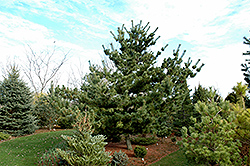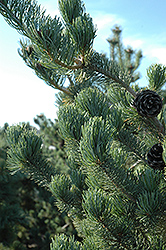It's all about ...
plants

Tempelhof Japanese White Pine
Pinus parviflora 'Tempelhof'
Height: 40 feet
Spread: 40 feet
Sunlight:
![]()
Hardiness Zone: 5a
Other Names: Blue Compact
Description:
This variety's apperance is compared to the standard blue form but has the reputation of being a stronger grower; a pyramidal pine with short five needled bundles that are much bluer than most varieties
Ornamental Features
Tempelhof Japanese White Pine is primarily valued in the landscape for its ornamental globe-shaped form. It has attractive steel blue evergreen foliage. The needles are highly ornamental and remain steel blue throughout the winter.
Landscape Attributes
Tempelhof Japanese White Pine is a dense evergreen tree with a strong central leader and a more or less rounded form. Its relatively fine texture sets it apart from other landscape plants with less refined foliage.
This is a relatively low maintenance tree. When pruning is necessary, it is recommended to only trim back the new growth of the current season, other than to remove any dieback. It has no significant negative characteristics.
Tempelhof Japanese White Pine is recommended for the following landscape applications;
- Accent
- Shade
Planting & Growing
Tempelhof Japanese White Pine will grow to be about 40 feet tall at maturity, with a spread of 40 feet. It has a low canopy with a typical clearance of 4 feet from the ground, and should not be planted underneath power lines. It grows at a medium rate, and under ideal conditions can be expected to live to a ripe old age of 100 years or more; think of this as a heritage tree for future generations!
This tree should only be grown in full sunlight. It prefers dry to average moisture levels with very well-drained soil, and will often die in standing water. It is considered to be drought-tolerant, and thus makes an ideal choice for xeriscaping or the moisture-conserving landscape. It is not particular as to soil type or pH, and is able to handle environmental salt. It is somewhat tolerant of urban pollution. This is a selected variety of a species not originally from North America.
This plant is not reliably hardy in our region, and certain restrictions may apply; contact the store for more information.

